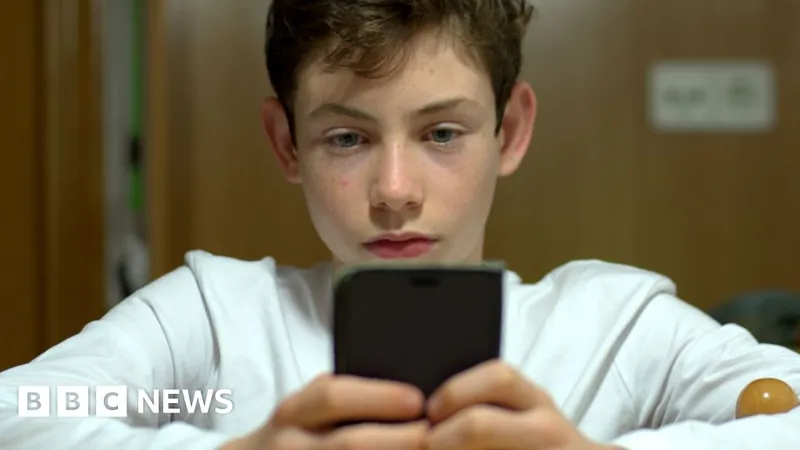
Australia Sets Bold New Social Media Restrictions for Kids—Is This the Solution We've Been Waiting For?
2024-11-28
Author: Ting
Australia's Bold Move
In a groundbreaking move, Australia is on the verge of implementing the strictest ban on social media for children globally. The proposed legislation will prohibit anyone under the age of 16 from accessing social media platforms without exceptions for existing users or parental consent. This ambitious move aims to protect the mental health and well-being of children, a concern echoed by many parents across the nation.
Government Support
Prime Minister Anthony Albanese emphasized the need for young Australians to enjoy their childhood free from the pressures and potential dangers of social media. "We want parents to have peace of mind knowing their children are safeguarded from the often toxic online environment,” he stated while introducing the bill to the House of Representatives last week.
Legislative Progress
Having garnered significant support, the bill recently passed in the Senate by a vote of 34 to 19 and is now set to return to the House for further amendments before it becomes law. The specific platforms targeted by the ban have yet to be outlined, with authority resting with Australia’s communications minister, who will consult the eSafety Commissioner to identify which networks to restrict. Notably, messaging apps and gaming platforms will remain exempt from these regulations.
Implementation Challenges
Implementation hinges on age-verification technology, which is currently under examination. While the government anticipates that social media companies will develop these verification processes, many digital experts express skepticism. Concerns have been raised about the reliability of various age-verification methods, which might incorporate biometrics or personal identity information. Critics are also worried about how children's privacy will be safeguarded amid these new measures.
Potential Loopholes
Moreover, digital-savvy children may easily bypass these restrictions using Virtual Private Networks (VPNs), allowing them to access banned platforms as if they were located in other countries. Importantly, kids caught circumventing the rules will not face penalties, creating a potential loophole that could undermine the law's effectiveness.
Public Sentiment
Despite some hesitations in the tech industry, public sentiment appears largely in favor of these changes. Polling indicates overwhelming support from Australian parents, who have expressed frustration over the increasingly addictive nature of children's devices. Advocates for the ban argue that parents often feel trapped between the decision to allow their children unrestricted access to social media or risk their emotional well-being.
Criticism of the Ban
However, critics argue that such a sweeping ban could push children toward less regulated parts of the internet and limit their exposure to beneficial online communities. Google and Snap have voiced their concerns over the lack of clarity in the legislation, while TikTok described the government's definition of social media platforms as broad, potentially encompassing a wide array of online services.
Youth Perspectives
Youth advocates warn that the government’s approach might not reflect a true understanding of how social media integrates into young people's lives. The eSafety Youth Council, which advises the regulator, emphasized the importance of involving the youth in discussions about their digital safety.
Looking Ahead
Despite the challenges, Prime Minister Albanese remains resolute in his stance. "Technology evolves rapidly, and while some may attempt to find loopholes, we must not shy away from our responsibility to protect our children," he stated.
Global Implications
As Australia takes this bold step, international observers are watching closely. France has attempted similar measures, banning social media use for children under 15 without parental consent, yet studies show that many youths quickly found ways to bypass such restrictions. Meanwhile, a comparable law in Utah, USA, was struck down for being unconstitutional.
Conclusion
With countries like Norway following suit and the UK considering similar regulations, Australia’s proposed laws could shape the future of social media governance around the world. The question remains, will these restrictions create a safer digital landscape for children, or will they push young users further into the shadows of the web? Stay tuned as this story develops!




 Brasil (PT)
Brasil (PT)
 Canada (EN)
Canada (EN)
 Chile (ES)
Chile (ES)
 España (ES)
España (ES)
 France (FR)
France (FR)
 Hong Kong (EN)
Hong Kong (EN)
 Italia (IT)
Italia (IT)
 日本 (JA)
日本 (JA)
 Magyarország (HU)
Magyarország (HU)
 Norge (NO)
Norge (NO)
 Polska (PL)
Polska (PL)
 Schweiz (DE)
Schweiz (DE)
 Singapore (EN)
Singapore (EN)
 Sverige (SV)
Sverige (SV)
 Suomi (FI)
Suomi (FI)
 Türkiye (TR)
Türkiye (TR)